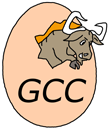g++
Implementation of programming language C++g++ is the short nickname for GNU C++ compiler, which is included in GNU Compiler Collection.
The Collection was extended to handle C++ in December 1987, the same year as it was released. It is distributed under GNU GPL and is an important example of free software.

GCC logo
Examples:
Hello, World!:
Example for versions Borland C++ Builder 6, Microsoft Visual C++ 6, Microsoft Visual C++ 9 (2008), g++ 3.4.5#include <iostream>
int main(void)
{
std::cout << "Hello, World!" << std::endl;
return 0;
}
Factorial:
Example for versions Borland C++ Builder 6, Microsoft Visual C++ 6, Microsoft Visual C++ 9 (2008), g++ 3.4.5This example uses recursive factorial definition.
#include "stdio.h"
__int64 factorial(__int64 n)
{
return ( n==0 ? 1 : n*factorial(n-1) );
}
int main(int argc, char* argv[])
{
for (int n=0; n<=16; n++)
printf( "%d! = %I64d\n", n, factorial(n) );
return 0;
}
Hello, World!:
Example for versions Borland C++ Builder 6, Turbo C++ 1.01, g++ 3.4.5, gcc 3.4.5, gcc 3.4.5 (Objective-C), gcc 4.2.4, tcc 0.9.25#include <stdio.h>
int main()
{
printf("Hello, World!\n");
return 0;
}
Factorial:
Example for versions Borland C++ Builder 6, g++ 3.4.5This example uses recursive factorial definition.
#include <iostream>
unsigned long long factorial(unsigned long long n)
{
if (n == 0)
return 1;
else
return n * factorial (n - 1);
}
int main(void)
{
for (int n = 0; n <= 16; n++)
std::cout << n << "! = " << factorial(n) << std::endl;
return 0;
}
Fibonacci numbers:
Example for versions Borland C++ Builder 6, Microsoft Visual C++ 6, Microsoft Visual C++ 9 (2008), g++ 3.4.5This example uses recursive definition of Fibonacci numbers.
#include <iostream>
int fibonacci(int n)
{
return ( n<=2 ? 1 : fibonacci(n-1) + fibonacci(n-2) );
}
int main(void)
{
for (int n=1; n<=16; n++)
std::cout << fibonacci(n) << ", ";
std::cout << "..." << std::endl;
return 0;
}
Quadratic equation:
Example for versions Borland C++ Builder 6, Microsoft Visual C++ 9 (2008), g++ 3.4.5, gcc 3.4.5, gcc 3.4.5 (Objective-C), gcc 4.2.4, tcc 0.9.25This example works both for C and C++, as well as for Objective-C which is superset of C.
#include <math.h>
#include <stdio.h>
int main()
{
int A, B, C;
double D;
printf("A = ");
scanf("%d", &A);
if (A == 0) {
printf("Not a quadratic equation.\n");
return 0;
}
printf("B = ");
scanf("%d", &B);
printf("C = ");
scanf("%d", &C);
D = B * B - 4 * A * C;
if (D == 0) {
printf("x = %f\n", -B / 2.0 / A);
return 0;
}
if (D > 0) {
printf("x1 = %f\nx2 = %f\n",
(-B + sqrt(D)) / 2.0 / A, (-B - sqrt(D))/ 2.0 / A);
} else {
printf("x1 = (%f, %f)\nx2 = (%f, %f)\n",
-B / 2.0 / A, sqrt(-D) / 2.0 / A, -B / 2.0 / A, -sqrt(-D) / 2.0 /A);
}
return 0;
}
CamelCase:
Example for versions Borland C++ Builder 6, Microsoft Visual C++ 9 (2008), g++ 3.4.5This example is based on character-by-character string processing.
getline reads a string (delimited with end of line) from argument stream. Function tolower works only with single characters, so to convert whole string to lower case it is used with transform function. The latter applies tolower to all elements in the range [text.begin(), text.end()) and stores the results in a range starting with text.begin() again.
After this the string is processed char-by-char. Each character is checked for being alphabetic; if it is, it is appended to the resulting string (converted to upper case if previous character was non-alphabetic); if it is not, it only affects lastSpace (which is true only if last character was non-alphabetic).
isalpha works with both uppercase and lowercase letters, so it was possible not to convert the input string to lowercase, but rather to convert each appended character.
#include <string>
#include <iostream>
#include <algorithm>
using namespace std;
int main() {
string text, cc="";
bool lastSpace = true;
getline(cin, text);
transform(text.begin(), text.end(), text.begin(), (int (*)(int))tolower);
for (int i=0; i<text.size(); i++)
if (isalpha(text[i])) {
if (lastSpace)
cc += toupper(text[i]);
else
cc += text[i];
lastSpace = false;
}
else {
lastSpace = true;
}
cout << cc << endl;
return 0;
}
Comments
]]>blog comments powered by Disqus
]]>